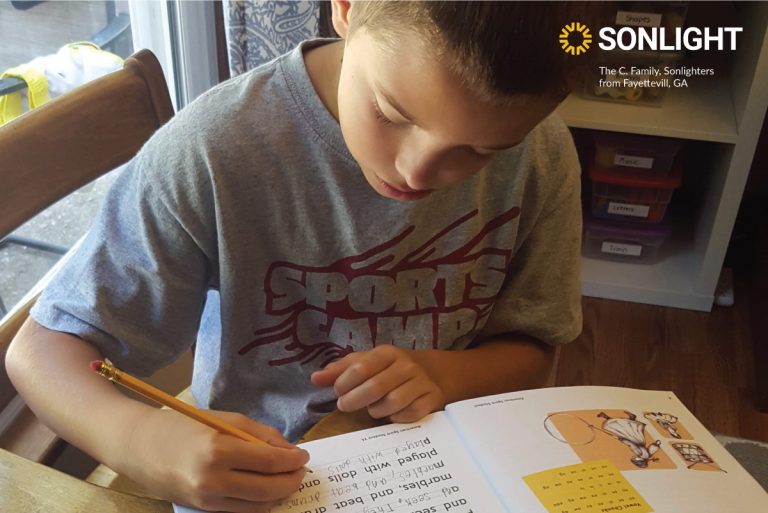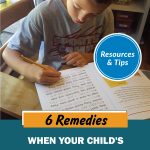Has your child ever written a completely indiscernible sentence? Is their spelling so atrocious that you can’t even make out simple words? Don’t fret...we are here to help you find the resources and tips you need!

I understand. The English language is tough. The same letters that make one sound also make another completely different sound, and sometimes, one sound can be made by two different letters! The insanity of it all! Are you ready to get your child back on track with spelling. Read on!
1. Know What’s Normal
First, you should know that it is completely normal for early elementary students to use inventive spelling. Not only is it normal, but you should encourage it.
Inventive spelling is when children write a word exactly the way it sounds to them.
When they attempt to spell, they tap into their knowledge of phonics and try their hand at early writing. So don’t worry if your child is young and is not including vowels in their words just yet. Inventive spelling is a normal step in the progression to spelling correctly.
2. Fix It Immediately
99% of all spelling errors by proficient readers are caused by a lack of effort or a busy mind. While I completely made up that statistic, I am pretty sure that I’m close.
Most spelling errors made by an independent reader are caused by a child who is rushing to finish a task or one whose mind works faster than her pencil.
This is why I am a huge fan of immediate feedback. As your child is working or as soon as he or she finishes their work, you should be ready to help them perfect it.
If they missed the spelling of a word, simply say, “Hmm...that word doesn’t quite look right. I would like for you to please go look at that and see if you can correct it.” There’s no need to shame or belittle your child. Simply have them take a second look and correct their mistake. Most of the time, they literally didn’t notice it and will welcome the feedback. Once the expectation is set that you will have them correct their mistakes, they will become more careful about checking their work before bringing it to you.
3. Apply Phonics Instruction
Many poor spellers are also struggling readers. These students benefit from phonics instruction, even if they are older. I really like All About Spelling —a spelling program based on phonics instruction. It’s also really fun. The creator of the series has worked very hard to make phonics interesting and engaging, and it shows. Your child will enjoy the various activities used in this program, and it will help with reading skills as well.
Spelling and reading go hand in hand, so if you boost spelling, you boost reading, and vice versa.
Another series I recommend for younger children is Explode the Code. While Explode the Code is a phonics program, I also love it for spelling. It is a very gentle workbook, so it’s not overkill if you are already doing a virtual education.
4. Use Repetition
Some children simply need repetition. The more they write the words, the better they will remember how to spell them. Visual learners tend to do well with this method as they really don’t need to think about the spelling as much as see it over and over.
Once they can see the word in their head, they will likely never miss the spelling again.
For these visual learners, Spelling You See is a great choice. This copywork-based series uses exposure as a learning tool to help children remember how to spell a word correctly. The child repeatedly writes the word throughout the week with the idea that the exposure will create mastery. I think this is a fantastic way to tackle spelling for the child who learns by repetition.
5. Play Games
I think a lot of people my age learned to spell from playing Scrabble. I know that I certainly brushed up on my skills playing that game. We often forget that games are more than just good fun. They are a way that we learn as well.
Of course, I would recommend Scrabble, but games like Bananagrams and Boggle are also great for spelling practice.
You might also play car spelling games too. At a stoplight, say a word for something you can see around you, and have the child try to spell it. If they miss it, say, “Oh, so close!” and then say the correct spelling. Have them repeat you. These types of games are great for on-the-go families.
6. Read, Read, Read
Read to your child. Read with your child. Encourage your child to read on his own. Buy or borrow printed materials such as books, magazines, or newspapers for your child.
Exposure to words is a sure-fire way to boost your child’s spelling. It’s a win-win.
Spelling is a tough subject to master, but be patient. It takes time, but you will see progress as you keep working at it. Keep encouraging them.
I once heard the owner of a business where my husband and I worked say that he immediately threw away job applications that included misspelled words. You might think he was the boss of a big business where a lot of writing would be required, but we worked at a funeral home and never wrote a single word for the company. However, he figured that if the person didn’t have the ability to spell correctly or at least put forth the effort to use spell check, he didn’t want them working with him.
So often, we brush aside spelling as a lesser important subject, but it is worthy of our time and effort. Your child will see that eventually as well. Prepare them to get that job one day. Teach them to spell well.
Advisors are on hand to help you choose the best resources for your child. Contact one today.








